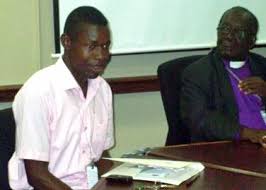New activist network fights AIDS and anti-LGBT laws
Colin Stewart is a 45-year journalism veteran. He is the…
Twenty-six LGBT activists traveled to Washington, D.C., two weeks ago, seeking to change a world where homosexuality is illegal in 76-plus countries.

Now that the International AIDS Conference is over, they are returning to their home countries, strengthened by the creation of a new faith-based network of activists with a common goal —- guaranteeing the human rights and health of lesbians, gays, bisexuals and transgender people in those 76 homophobic societies.
“Against all odds they are working for inclusion and access to health services, church altars and the human rights for LGBT people in their countries. They are gay and straight, fresh young activists and older seasoned champions of truth, many of whom have created pioneering LGBT and HIV services for their home communities,” said the Rev. Canon Albert Ogle, founder of the St. Paul’s Foundation for International Reconciliation, which sponsored the Spirit of 76 Worldwide program that organized and paid for the gathering of activists.
Three of the advocates came from Jamaica and Malawi, where, despite widespread homophobia, national leaders have publicly announced their intention to end anti-LGBT discrimination. These activists’ task on returning home will be to build public support for those proposed changes.
The new Spirit of 76 Worldwide network includes two bishops, several priests and pastors, health workers, youth leaders, and many others whose faith leads them to confront the public health consequences of religion-based opposition to homosexuality.
“They had never been together as a group but there was a deep bond of trust created immediately as they began to share their work and their stories,” Ogle said. “Some are Evangelicals while 40 percent are practicing Catholics. We have an agnostic who wanted to learn more about religion because he wanted to improve relations with the faith community in Singapore where he runs one of the few LGBT programs. We have a Muslim and a few African Anglicans whose churches had condemned them for working with criminals.”
While in Washington, the group:
- Met with World Bank staff, who welcomed the activists’ visit at a time when the bank is studying ways to prevent its programs from inadvertently harming sexual minorities in developing countries
- Met with State Department staff to nudge them to provide concrete support to back up Secretary of State Hillary Clinton’s declaration last year that “gay rights are human rights.”
- Addressed gatherings focused on the faith community’s impact on the AIDS epidemic, especially among men who have sex with men.
- Presented the documentary film “Call Me Kuchu” about religion, homophobia and the “Kill the Gays Bill” in Uganda.
- Spoke at Washington area churches and took part in an interfaith service at the National Cathedral.
- Met with about a dozen conservative American lawmakers and their staff to tell them how the 76 countries’ laws against homosexuality undercut U.S. anti-AIDS efforts abroad.
During their time in Washington, the activists also were trained in how to tell their stories most effectively and how to convince other people of faith of the need for dialogue and compassion, despite theological disagreements.
In addition, they set up a social media network that will allow the group to stay in touch with each other, offer suggestions, and provide encouragement in their common endeavors.
Shortly before leaving Washington, the activists shifted their focus to their next projects, which Spirit of 76 Worldwide organizers will present to potential donors who want to support faith-based initiatives against AIDS and for LGBT rights.
Among the proposals under consideration are plans for:
- Respectful interfaith dialogues in several countries, seeking to dispel homophobia by inviting clergy and lay people to discuss faith, AIDS and anti-homosexuality laws.
- Instructional videos about HIV, LGBT people and faith.
- An African website that would allow online discussions of issues such as AIDS, religion and homosexuality, even where a repressive regime forbids such discussions in public.
- Faith-based gay-straight alliances to combat AIDS, especially among marginalized sexual minorities.
The group has turned its past tribulations into future strengths, one African activist said.
“Like the Old Testament Job, all the people in the team have a heart-rending story to tell which scarred them. From tales of prejudice, personal attacks right down to the ills of ‘corrective rape,’ the people have had dark days behind them,” he said.
“But like the sores all over Job’s body, they have healed and are in the process of healing in a remarkable turn of events. What has not killed them has now made them hardened and determined to achieve their goals of decriminalization in their countries.”
Such partnerships are a source of strength and inspiration, said an HIV-positive Roman Catholic human rights activist who was widowed by AIDS in 1999 and now leads a health organization battling the disease in Uganda.
“We need a strong advocacy team, because for us in Africa, individually, it is not very easy for us to speak up,” she said. “But when we form a group, [we are stronger].”
Related articles
- AIDS panelist: Disagree on theology, but shun genocide (76crimes.com)
- World Bank may join fight against anti-LGBT bias (76crimes.com)
- American Christian leaders oppose ‘Kill the Gays Bill’ (76crimes.com)
- Hosts needed for anti-AIDS, pro-LGBT activists heading to D.C. (76crimes.com)
- How to combat repression of LGBT people (76crimes.com)


